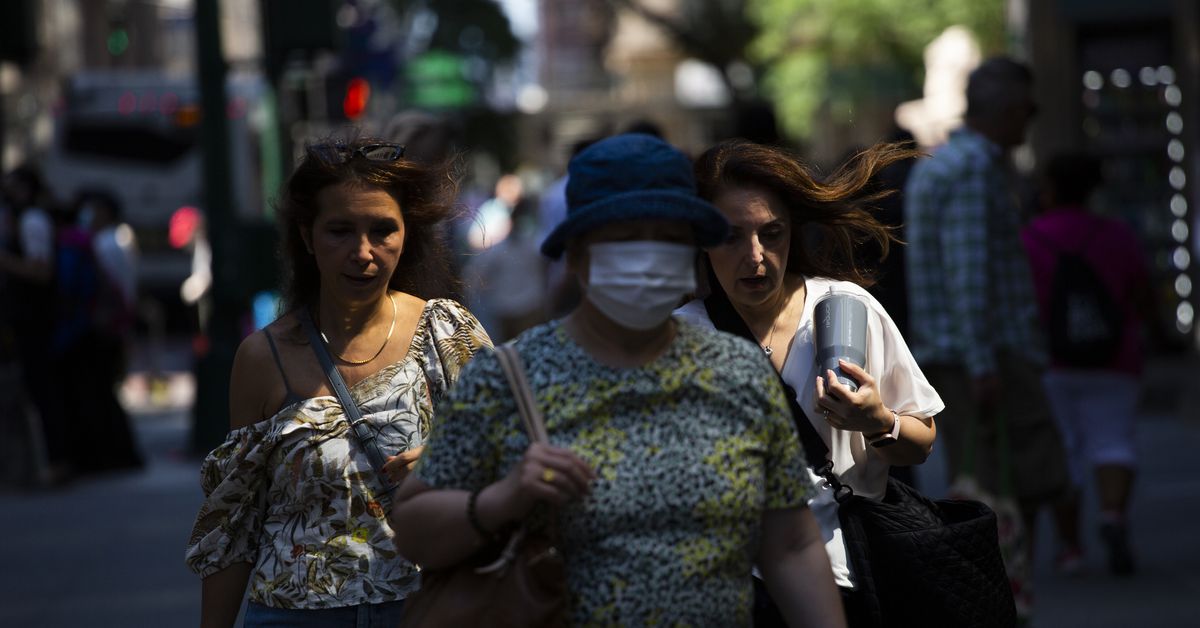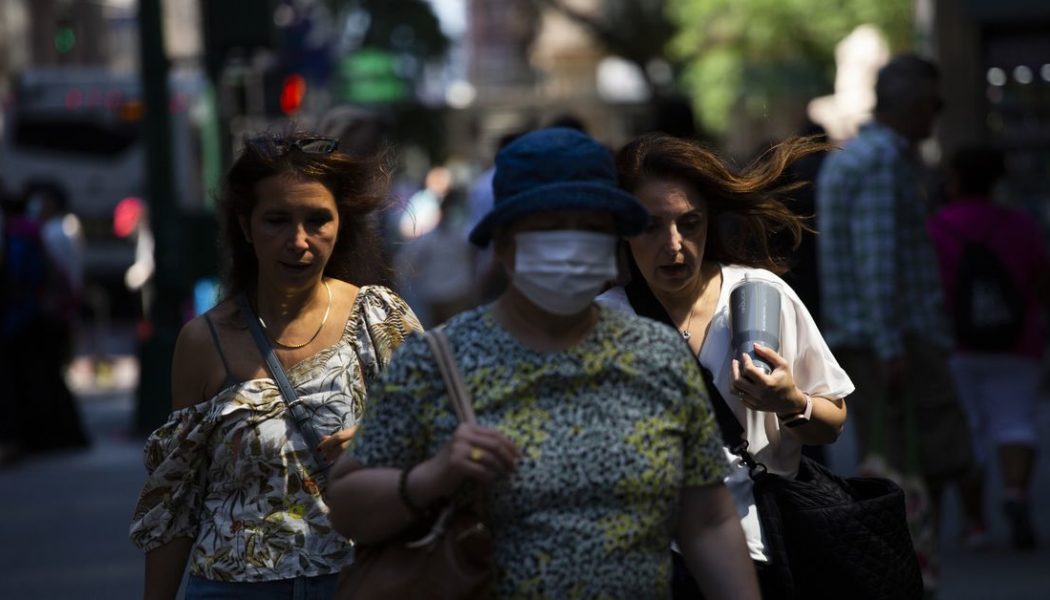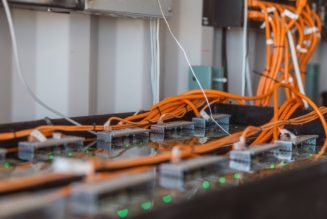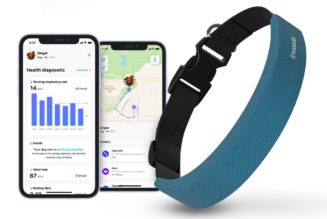
With COVID-19 restrictions lifting in some places and outbreaks popping up in others, the pandemic has officially entered the weird zone.
Okay, there’s nothing official about it, but the entire world is in a strange transition time right now — and likely will be for a while. Unlike the jump-cut into the pandemic, or even the suspenseful vaccine ramp-up, this time is more hopeful, less frantic, but also stretched out in an uneven mess. Places, populations, and even industries are moving at different paces as they move back to some semblance of normality.
It’s like the entire globe is playing by a perverse version of “yes, and.” Yes, more people are vaccinated in the US than before, and immunocompromised people are still at risk. Yes, the vaccines that we have are stunningly effective, and they are in such short supply that many countries are absolutely desperate to get them.
Here in the US, one of the most visible transitions is the vanishing act of various COVID-19 regulations. New York lifted most restrictions this week, and Disneyland reopened to everyone, without mask requirements. People in those areas are enjoying a return to offices, and restaurants and blessed normalcy — especially in regions where case rates are low. At the same time, parts of the country where vaccination rates have stayed low face the potential of summer surges. Tensions between different regions will linger as long as disparities remain.
In the pharmaceutical and research realm, there’s a different shift. The flurry of clinical trials and lab work that accompanied vaccine development is now slowing. There are still thousands of questions, but the biggest and most urgent — can we make a vaccine? — has been answered. Now, research focuses have shifted and split. Some are still working on vaccines and boosters, others are investigating new COVID-19 drugs or seeking to understand the virus’s origins and mechanics, and others have gone back to different projects entirely. With vaccines, the biggest issues are now monitoring and distribution, not research and development.
How people feel about all of these changes is another factor entirely — personal shifts in priorities, fears, and emotions are going to play a huge role in this next phase of the pandemic. As vaccinations go up and case numbers go down, eventually, we’ll get used to the coronavirus, and it will cease to be an unknown threat. We’ll stop thinking about it every day — some people already have.
In the meantime, most people are stuck somewhere in the wide gap between caution and abandon. Each person will eventually move past their own personal marker for the pandemic era. It might come when they get that second shot or step into a theatre for the first time or leave a mask sitting on the table at home. As with all transitions, something will end, and something else will take its place.
As a quick note before we get into what happened with COVID-19 this week, I also wanted to note that you might see some new (small) changes to this newsletter. Eventually, we’ll shift the newsletter over to a weekday instead of a Saturday. And starting next week, I’ll be handing over the reins to Nicole Wetsman, The Verge’s health reporter. She’s been filling in periodically, but I’m thrilled to have her writing to you more regularly.
Some things won’t change, at least not yet. We’ll keep covering the pandemic and keep you up to date with what’s going on in the world.
Thank you so much for joining us each week.
Research
People hospitalized with COVID-19 now have one overwhelming thing in common. They’re not vaccinated.
In the US, there’s more proof that vaccines are overwhelmingly effective. Doctors and health systems are increasingly reporting that the COVID-19 patients showing up for treatment are not vaccinated. (Elizabeth Weise and Aleszu Bajak/USA Today)
Struggling Hospitals Could Explain Why So Many Black Patients Have Died Of COVID-19
A study published this week found that one reason for the horrifying disparities in COVID-19 deaths in the US might come down to a paucity of healthcare resources in hospitals that serve Black patients. (Stephanie M Lee/BuzzFeed News)
Development
CureVac fails in pivotal COVID-19 vaccine trial with 47% efficacy
A different mRNA vaccine just tanked a clinical trial, only showing 47 percent efficacy against the virus. It’s a setback for the vaccine, which some hoped would help bolster the global supply. (Ludwig Burger/ Reuters)
Inside Pfizer’s race to produce the world’s biggest supply of COVID vaccine
A look inside the company’s race to produce its new vaccine on an unprecedented scale. (Christopher Rowland/The Washington Post)
A Pill to Treat Covid-19? The U.S. Is Betting on It.
$3 billion has now been set aside to help researchers dig into a treatment for COVID-19. Instead of a vaccine, which prevents the virus from taking hold, a treatment would combat the disease when a person actually has it. (Carl Zimmer/The New York Times)
Perspectives
India’s fighting a battle against COVID-19 on WhatsApp
Accredited social health activists are the foot soldiers of India’s rural healthcare system. Lately, they’ve also taken on the daunting task of fighting COVID-19 misinformation, mostly in local WhatsApp groups. Take a peek inside their efforts to bust misinformation in their villages. (Sanket Jain/The Verge)
The phones were ringing, pagers going off, doors opening and closing, IV pumps beeping, ventilators oscillating, and then there was Karl, with a respectful smile, just quietly and efficiently moving bodies onto a metal gurney, and then covering them with a black tarp.
— Courtney Martin, head of maternity services at Loma Linda University Medical Center, writes about Karl, a vital worker during the pandemic. Maria L La Ganga helped tell his story in the Los Angeles Times.
Perspectives
To the people who have received the 2.51 billion vaccine doses distributed so far — thank you.
To the more than 177,201,586 people worldwide who have tested positive, may your road to recovery be smooth.
To the families and friends of the 3,836,036 people who have died worldwide — 600,880 of those in the US — your loved ones are not forgotten.
Stay safe, everyone.









